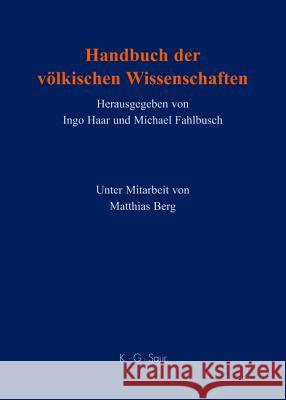Handbuch der völkischen Wissenschaften » książka
Handbuch der völkischen Wissenschaften
ISBN-13: 9783598117787 / Angielski / Twarda / 2008 / 846 str.
The handbook deals with the topic of "voelkische Wissenschaften" (Volkish Science). It contains individual biographies and describes research programmes, institutions, foundations, journals, offices and political fields. It highlights the nazification of science and scholarship from 1933 onwards, the mobilisation of academics for purposes of war, resettlement and annihilation up to 1944/45 and the recruitment of historians, geographers, population experts, ethnographers, theologians and other academic experts in pursuit of "Juden- und Biopolitik" (Jewish and biological policies). In addition, the individual biographies illustrate breaks and continuities after 1945. "Volkisch academic enthusiasts took major positions in terms of strategic aims and defining German identity. This Handbook defines their evocative and yet - from today's standpoint - historically distinctive values from the 1920s to the 1960s. ... Key questions arise concerning the links of this militant volkisch research to the Holocaust and German war aims. A range of racial commissions operated, and supplied the army and SS with interdisciplinary expertise on identifying racial characteristics, and determining resettlement and population policies. Academics were drafted into key areas like occupied Poland and the Ukraine to advise on policies, and the worth of local populations as regards their potential for re-germanisation - or eradication. "De-judification" emerged as the over-arching target. A vast, and megalomaniac planning apparatus served the aims of population "clearance" and racial "cleansing." The Handbook raises disturbing issues about the role of academics in defining "race" and ethnicity, in supporting lethal population "transfers," and in generating rationales for military intervention and the confrontation with cultural values, which might appear as alien and threatening. The truth is that it was the volkisch cultural standpoint which constituted the threat to stability and existence of millions in a century of violence and genocide." (Paul Weindling, Oxford)











